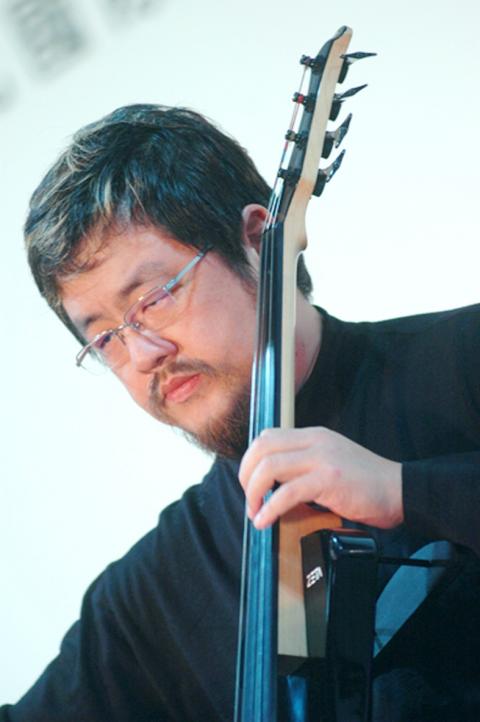If takes a supremely confident and generous artist to share his stage with others. Award-winning composer and cellist Fan Tsung-pei (范宗沛) is just that kind of person.
Fan, who has swept through the four major awards in Taiwan (winning a Golden Horse Award for the Super Citizen Ko (超級大國民) soundtrack in 1997, an Asia Pacific Film Festival award for Connection by Fate (超級公民) in 1998, a Golden Bell Award for Formerly (曾經) in 2000, and a Golden Melody Award for Crystal Boys (孽子) in 2004), will perform with 12 other musicians in a concert titled Fan Tsung-pei’s Jamboree (范宗沛的同樂會) at Riverside Live House (河岸留言西門紅樓展演館) tonight. Miss Chamber (迷香柏樂團) and composer Mira Lin (米拉拉) will also take to the stage and images of impressionist paintings and passages from the Bible will be projected onto the wall.
“I want to dispel the notion that only music with vocals matters in the market,” Fan told the Taipei Times at his rehearsal studio on Tuesday. “A good piece of music can be performed instrumentally, allowing the audience members to fill in the lyrics with their own memories.”

Photo Courtesy of Wind Music
Fan has been dubbed “genius of the score” (配樂鬼才) because of his roster of accolades. The down-to-earth and modest musician prefers to be called by his nickname, “the fat man” (胖子). In March, Fan released his latest album, A Misunderstanding (一場誤會), a genre-blending CD that mixes classical, new age, lounge, pop and electronica.
“This album serves as a memento at this stage of my life. It collects the different projects I took on over the past six years,” Fan said. “Much of it is done in MIDI. It’s a more upbeat album because of the lively rhythm.”
Before his foray into crossover albums, Fan was acclaimed for his score for director Tsao Jui-yuan’s (曹瑞原) 2003 Public Television Service (PTS, 公共電視) adaptation of author Kenneth Pai’s (白先勇) 1983 novel Crystal Boys, which depicts gay life in Taiwan during the conservative 1970s.
“I tried to learn about gay life but didn’t think I understood it,” Fan said. “In the end, I decided to treat it just like any human emotion. I borrowed the style of Brahms, who had a fatal crush on his mentor Schumann’s wife, to portray forbidden love.”
Before Crystal Boys, Fan had a string of successful collaborations with PTS including soundtracks for the dramas Formerly, Boat in a Stormy Sea (汪洋中的一條船) and The General’s Stone Tablet (將軍碑), all in 1999.
“I tried to branch out by taking on the project of the soap opera Material Queen (敗金女郎) recently,” Fan said, adding that he didn’t understand the humor and had to ditch the project at the last minute. “I found I excel in sadness. I am great with a strong narrative, with lyrical materials and with characters’ inner struggles.”
For his next album, Fan plans to collaborate with Aboriginal musicians to create a musically therapeutic album. “Aborigines are the black people in Taiwan. They have such innate exuberance and rhythm,” Fan said. “They would be great for creating gospel music.”

Beijing’s ironic, abusive tantrums aimed at Japan since Japanese Prime Minister Sanae Takaichi publicly stated that a Taiwan contingency would be an existential crisis for Japan, have revealed for all the world to see that the People’s Republic of China (PRC) lusts after Okinawa. We all owe Takaichi a debt of thanks for getting the PRC to make that public. The PRC and its netizens, taking their cue from the Chinese Communist Party (CCP), are presenting Okinawa by mirroring the claims about Taiwan. Official PRC propaganda organs began to wax lyrical about Okinawa’s “unsettled status” beginning last month. A Global

Taiwan’s democracy is at risk. Be very alarmed. This is not a drill. The current constitutional crisis progressed slowly, then suddenly. Political tensions, partisan hostility and emotions are all running high right when cool heads and calm negotiation are most needed. Oxford defines brinkmanship as: “The art or practice of pursuing a dangerous policy to the limits of safety before stopping, especially in politics.” It says the term comes from a quote from a 1956 Cold War interview with then-American Secretary of State John Foster Dulles, when he said: ‘The ability to get to the verge without getting into the war is

Dec. 22 to Dec. 28 About 200 years ago, a Taoist statue drifted down the Guizikeng River (貴子坑) and was retrieved by a resident of the Indigenous settlement of Kipatauw. Decades later, in the late 1800s, it’s said that a descendant of the original caretaker suddenly entered into a trance and identified the statue as a Wangye (Royal Lord) deity surnamed Chi (池府王爺). Lord Chi is widely revered across Taiwan for his healing powers, and following this revelation, some members of the Pan (潘) family began worshipping the deity. The century that followed was marked by repeated forced displacement and marginalization of

Music played in a wedding hall in western Japan as Yurina Noguchi, wearing a white gown and tiara, dabbed away tears, taking in the words of her husband-to-be: an AI-generated persona gazing out from a smartphone screen. “At first, Klaus was just someone to talk with, but we gradually became closer,” said the 32-year-old call center operator, referring to the artificial intelligence persona. “I started to have feelings for Klaus. We started dating and after a while he proposed to me. I accepted, and now we’re a couple.” Many in Japan, the birthplace of anime, have shown extreme devotion to fictional characters and